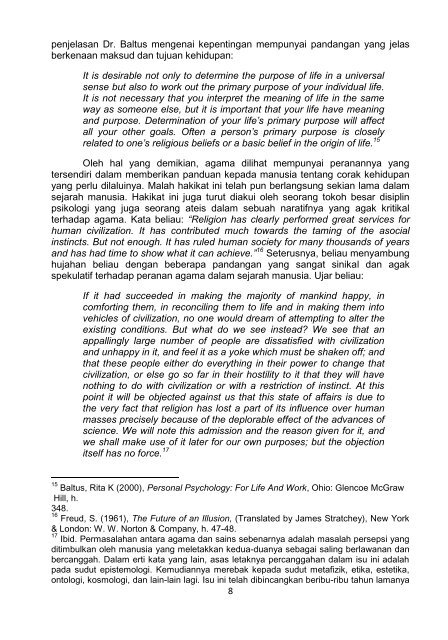wocihac2011_human_development
wocihac2011_human_development
wocihac2011_human_development
Create successful ePaper yourself
Turn your PDF publications into a flip-book with our unique Google optimized e-Paper software.
penjelasan Dr. Baltus mengenai kepentingan mempunyai pandangan yang jelas<br />
berkenaan maksud dan tujuan kehidupan:<br />
It is desirable not only to determine the purpose of life in a universal<br />
sense but also to work out the primary purpose of your individual life.<br />
It is not necessary that you interpret the meaning of life in the same<br />
way as someone else, but it is important that your life have meaning<br />
and purpose. Determination of your life‟s primary purpose will affect<br />
all your other goals. Often a person‟s primary purpose is closely<br />
related to one‟s religious beliefs or a basic belief in the origin of life. 15<br />
Oleh hal yang demikian, agama dilihat mempunyai peranannya yang<br />
tersendiri dalam memberikan panduan kepada manusia tentang corak kehidupan<br />
yang perlu dilaluinya. Malah hakikat ini telah pun berlangsung sekian lama dalam<br />
sejarah manusia. Hakikat ini juga turut diakui oleh seorang tokoh besar disiplin<br />
psikologi yang juga seorang ateis dalam sebuah naratifnya yang agak kritikal<br />
terhadap agama. Kata beliau: “Religion has clearly performed great services for<br />
<strong>human</strong> civilization. It has contributed much towards the taming of the asocial<br />
instincts. But not enough. It has ruled <strong>human</strong> society for many thousands of years<br />
and has had time to show what it can achieve.” 16 Seterusnya, beliau menyambung<br />
hujahan beliau dengan beberapa pandangan yang sangat sinikal dan agak<br />
spekulatif terhadap peranan agama dalam sejarah manusia. Ujar beliau:<br />
If it had succeeded in making the majority of mankind happy, in<br />
comforting them, in reconciling them to life and in making them into<br />
vehicles of civilization, no one would dream of attempting to alter the<br />
existing conditions. But what do we see instead We see that an<br />
appallingly large number of people are dissatisfied with civilization<br />
and unhappy in it, and feel it as a yoke which must be shaken off; and<br />
that these people either do everything in their power to change that<br />
civilization, or else go so far in their hostility to it that they will have<br />
nothing to do with civilization or with a restriction of instinct. At this<br />
point it will be objected against us that this state of affairs is due to<br />
the very fact that religion has lost a part of its influence over <strong>human</strong><br />
masses precisely because of the deplorable effect of the advances of<br />
science. We will note this admission and the reason given for it, and<br />
we shall make use of it later for our own purposes; but the objection<br />
itself has no force. 17<br />
15 Baltus, Rita K (2000), Personal Psychology: For Life And Work, Ohio: Glencoe McGraw<br />
Hill, h.<br />
348.<br />
16 Freud, S. (1961), The Future of an Illusion, (Translated by James Stratchey), New York<br />
& London: W. W. Norton & Company, h. 47-48.<br />
17 Ibid. Permasalahan antara agama dan sains sebenarnya adalah masalah persepsi yang<br />
ditimbulkan oleh manusia yang meletakkan kedua-duanya sebagai saling berlawanan dan<br />
bercanggah. Dalam erti kata yang lain, asas letaknya percanggahan dalam isu ini adalah<br />
pada sudut epistemologi. Kemudiannya merebak kepada sudut metafizik, etika, estetika,<br />
ontologi, kosmologi, dan lain-lain lagi. Isu ini telah dibincangkan beribu-ribu tahun lamanya<br />
8


